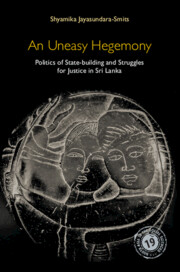Book contents
- Frontmatter
- Dedication
- Contents
- List of Tables and Figure
- Preface
- Acknowledgements
- List of Abbreviations
- 1 Introduction
- 2 Politics of Judgement
- 3 From Nationalism to Ethnic Supremacy
- 4 Political Patronage: Underbelly of Everyday Politics
- 5 State Institutions and Patronage Politics
- 6 War and Peace as Politics by Other Means
- 7 What Came after War?
- Afterword
- Appendix 1 Map of Sri Lanka
- Appendix 2 Indication of Background of Key Interviewees (from January to May 2009)
- Bibliography
- Index
Afterword
Published online by Cambridge University Press: 29 July 2022
- Frontmatter
- Dedication
- Contents
- List of Tables and Figure
- Preface
- Acknowledgements
- List of Abbreviations
- 1 Introduction
- 2 Politics of Judgement
- 3 From Nationalism to Ethnic Supremacy
- 4 Political Patronage: Underbelly of Everyday Politics
- 5 State Institutions and Patronage Politics
- 6 War and Peace as Politics by Other Means
- 7 What Came after War?
- Afterword
- Appendix 1 Map of Sri Lanka
- Appendix 2 Indication of Background of Key Interviewees (from January to May 2009)
- Bibliography
- Index
Summary
As this book is being readied for publication in a few weeks’ time, Sri Lanka is being swept by a serious economic and political crisis. The unfolding of the crisis in the coming weeks and months and the strategies the ruling regime will resort to will play a very important role in shaping the future trajectories of state-building, the elites’ hegemony-building project and addressing the broader issues pertaining to social justice.
Since the beginning of 2022, the country has slid into a deep economic and political crisis. This is a major setback for Gotabaya Rajapaksa's presidency, who came to power in 2019 promising a brighter future. Since early April 2022, people have been increasingly taking to the streets and chanting ‘go home’, the latter directed at the president. The majority of the protesters are drawn from urban, lower and upper middle class Sinhala-Buddhists, the same constituency who voted the Rajapaksas in. As the economic crisis is worsening by the day, the political crisis in Colombo is heating up too. At the time of writing of this afterword, the government has lost its simple parliamentary majority; its cabinet of ministers have resigned and parliamentarians from the ruling party have declared independent status. Despite protesters’ calls for resignation of the Rajapaksa brothers, they are making every move possible to cling on to power.
The looming economic and political crisis was already evident shortly before the year 2021 ended as the hold of the Rajapaksa family on the Sri Lankan state tightened. Some aspects of the economic crisis could have been better handled just six months ago if the ruling regime had listened to independent economic analysts and sought early financial assistance from the International Monetary Fund (IMF) to address its growing sovereign debt crisis. The Rajapaksa regime's economic mismanagement of state resources through continued rewards to capitalist cronies and family members further reinforced Colombo's economic decline. Even on the edge of the worst economic crisis since independence, the rapid passage of the Port City Bill raised concerns of some citizens and the media, who noted that the bill mainly benefited close friends and relatives of the Rajapaksas, while reinforcing close ties with Chinese state companies.
- Type
- Chapter
- Information
- An Uneasy HegemonyPolitics of State-building and Struggles for Justice in Sri Lanka, pp. 301 - 303Publisher: Cambridge University PressPrint publication year: 2022



